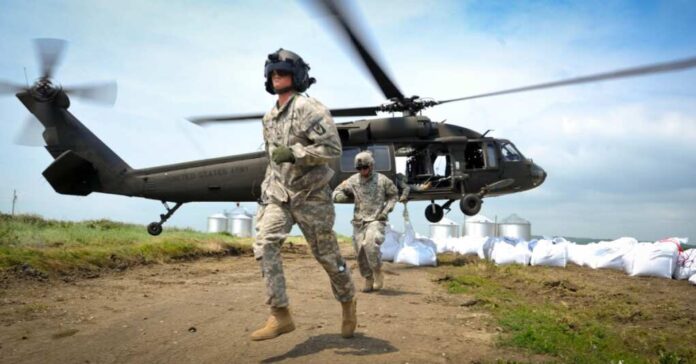
The National Guard seems to be making headlines more and more. We see them being deployed from South Dakota to help with the illegal migrant crisis in Texas. We see them being deployed by New York to help make the subways of NYC safer because of illegal immigrant crime.
But, is this what the National Guard was created for? Are we effectively using these military groups?
Biden has created a massive problem with the southern border, and the National Guard has been deployed to fix things, or at least to protect us from the crime brought by a nearly wide-open border.
The formation of militias that could be mobilized when needed became particularly important during revolutions, like the American Revolution fought from 1765-1783 against the British rule aiming for independence. In this unique blend of civic duty and strategic defensive deployment, several colonies came together towards united resistance.
As a young nation, the newly formed United States of America recognized the need for local militias not only to guard the country against threats but also to maintain law and order, especially in remote corners where regular state forces didn’t have enough manpower. In response, each individual state developed its own militia system in the aftermath of the Revolutionary War, often comprising of men who were previously revolutionaries. By 1792, a federal militia act was introduced that obliged all eligible male citizens between 18 and 45 to serve in their state’s military force when called upon, establishing what we now refer to as the National Guard.
This was later codified under Title 10 of the U.S. Code. The legislative efforts behind this creation were driven by the belief that if a standing army remained within the purse of the central government, it might pose potential threats to a republican society’s liberties and rights; hence disassociating the national military apparatus from the main military bodies helped solve many concerns.
Each state has its own ‘National Guard,’ acting under state authority but being subject to federal service regulation in times of emergency or crisis declared by the U.S President through the powers conferred by Congressional Legislation, i.e., the U.S. Code sections 313 (authorized under the Insurrection Act) or 18 United States Code § 1385 (under Emergency Detention Authority). Being in active service, Guardsmen could come to federal support, aid, combat operations, natural disaster assistance, or even national emergencies that demand their expertise and support.
Even with these powers, in normal circumstances, National Guards primarily serve their specific regional communities and perform a variety of duties, including assisting civil authorities in handling non-emergency tasks. This versatility and duality in functions embody their dual states’ obligations.
Of course, now, we’re seeing many of the National Guards work together to deal with Biden’s America. Biden won’t recognize the issues in Arizona, Texas, and other border states or in cities where illegal immigrants have been bussed (such as San Diego, Chicago, or New York City). As such, no federal funding has been issued to deal with the problem that he and his administration have created.
As such, it’s up to the National Guards.
Throughout American history, National Guards have been instrumental in responding to internal conflicts like during the Civil War and Reconstruction, providing humanitarian assistance during large-scale natural disasters and disease outbreaks like influenzas, supporting state and federal missions overseas during international conflicts, and enforcing law and order in times of civil disturbances, making the Guard an epitome of ‘shared’ national protection on one hand, and regional service and responsibility on another.
To further emphasize the dynamic relationship, since the enactment of federal laws like the 4th Amendment granting more privacy controls and prohibitions on unwarranted searches and seizures and the establishment of an Inspector General, the role as custodians of their communities’ rights and liberties remains at their core while upholding their broader Federal responsibilities throughout the years.
Ultimately, the National Guards are doing the roles they were made for—protecting against threats. Unfortunately, our own president is the one who created the threats.
At least we have the National Guards to deploy. Without them, who knows what we would do?














